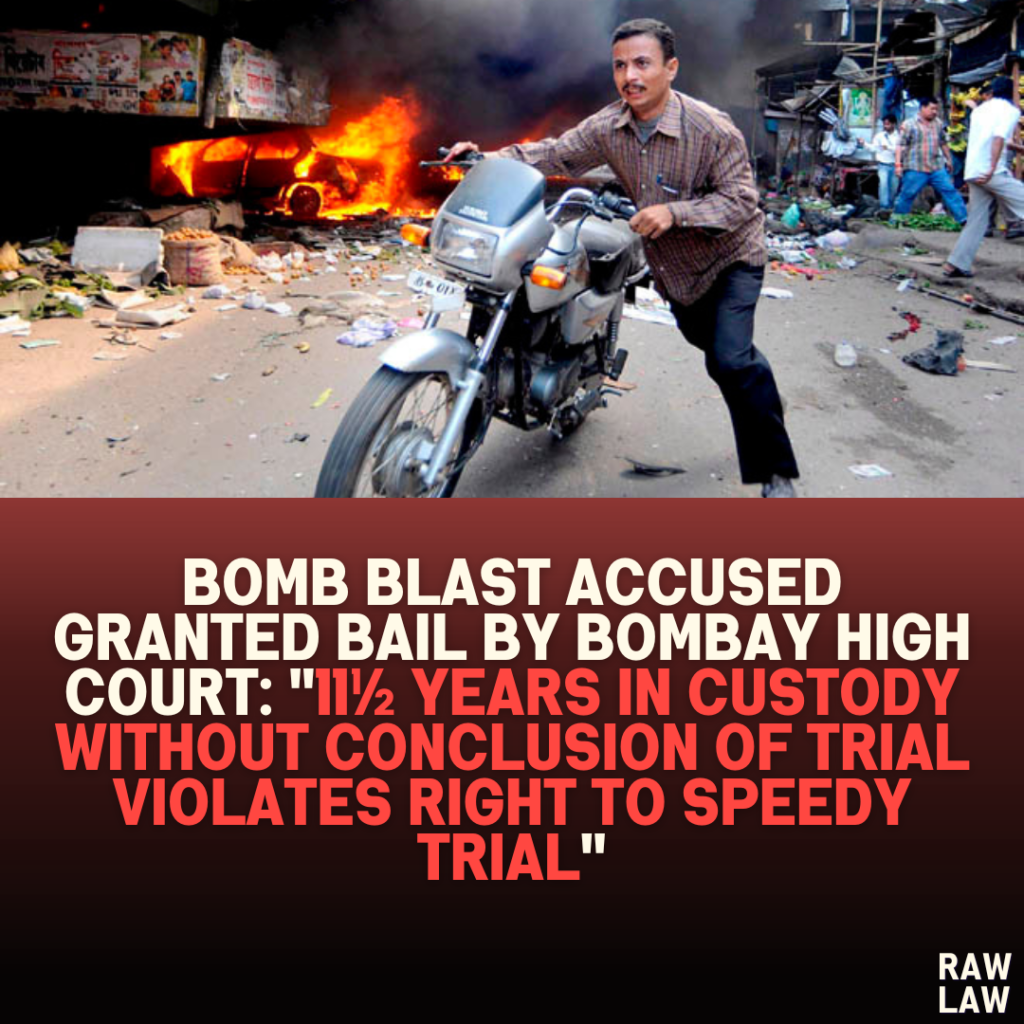Court’s Decision: The Bombay High Court granted bail to the appellant after 11½ years of pre-trial detention. The court quashed the lower court’s order, allowing the appellant’s appeal under Section 21(4) of the National Investigation Agency (NIA) Act, 2008. The court directed that the appellant be released on bail with strict conditions, emphasizing the right to a speedy trial as guaranteed under Article 21 of the Indian Constitution.
Facts: The case pertains to five bomb blasts that occurred in Pune City on 1st August 2012. The bombs, planted in bicycle baskets in crowded areas of the city, were allegedly intended to avenge the death of Quatil Siddique, a member of the banned Indian Mujahideen, who was murdered in jail. The appellant was accused of conspiring to execute the blasts. He was charged under several sections of the Indian Penal Code (IPC), Unlawful Activities (Prevention) Act (UAPA), Maharashtra Control of Organized Crime Act (MCOCA), and the Explosive Substances Act.
The appellant’s role was highlighted in confessions made by co-accused, who claimed that he participated in meetings and helped procure SIM cards used in the blasts. Despite the severity of the allegations, the appellant had not been granted bail, and his trial had been delayed for over a decade.
Issues:
- Whether the appellant should be granted bail given the long delay in the trial.
- Whether the charges against the appellant, including those under the UAPA, justified continued pre-trial detention.
Petitioner’s Arguments: The appellant’s counsel argued that the appellant had been in custody for 11½ years, and only eight witnesses had been examined out of the 107 listed by the prosecution. The charges had only been framed in 2022, with the first witness testifying in 2024. The delay in trial violated the appellant’s right to a speedy trial under Article 21 of the Constitution. The counsel also pointed out that the appellant was not directly involved in planting the bombs, and his role was limited to providing SIM cards. Further, the prosecution had earlier dropped certain charges against him, only to later reintroduce them.
Respondent’s Arguments: The Special Public Prosecutor argued that the seriousness of the crime justified the appellant’s continued detention. The prosecution emphasized that the appellant’s involvement was part of a larger conspiracy and that the trial had already been expedited.
Analysis of the Law: The court examined precedents from the Supreme Court concerning the balance between national security and the right to a speedy trial. The court noted that despite the stringent provisions of the UAPA and MCOCA, prolonged pre-trial detention without reasonable progress in the trial violated fundamental rights. The court cited the Supreme Court rulings in Javed Gulam Nabi Shaikh v. State of Maharashtra and K.A. Najeeb v. Union of India, which held that statutory restrictions could not override constitutional guarantees of liberty and speedy trial.
Precedent Analysis: The court referred to several cases, including Satender Kumar Antil v. CBI, where the Supreme Court stressed the importance of expediting trials in cases involving serious offenses. The court also considered the Shaheen Welfare Association case, which emphasized that prolonged detention without trial could cause irreparable harm to the accused and their families.
Court’s Reasoning: The court reasoned that the appellant had already spent over 11½ years in custody, and with only eight witnesses examined out of the 107 listed, there was no likelihood of the trial concluding soon. The court found that the delay in the trial was excessive and that continuing to detain the appellant without concluding the trial would violate his right to a speedy trial. While the court acknowledged the seriousness of the charges, it noted that the evidence against the appellant primarily came from confessional statements by co-accused, which had to be treated with caution.
Conclusion: The appeal was allowed, and the appellant was granted bail subject to strict conditions, including reporting to the National Investigation Agency (NIA) office once a month and not leaving the jurisdiction of the court without prior permission. The court directed the lower court to expedite the trial, ensuring it is completed as soon as possible. The appellant was required to post a bond of Rs. 1,00,000, and the prosecution was given the liberty to seek cancellation of bail if the appellant violated any of the conditions.
Implications: This judgment underscores the importance of balancing national security concerns with the fundamental right to a speedy trial. The court emphasized that even in cases involving serious offenses under special laws like the UAPA and MCOCA, prolonged pre-trial detention without reasonable progress in the trial process would violate the constitutional right to liberty. The decision highlights the need for courts to ensure that trials in such cases are conducted expeditiously to prevent undue hardship to the accused.
Also Read: Delhi High Court Dismisses Petition Against Interim Maintenance Award, Reaffirms ₹25,000 per Month for Wife and Minor Daughter, Emphasizing Petitioner’s Obligation to Support Family During Interim Period Pending Revision




Pingback: Delhi High Court Quashes DDA's Cancellation of Conveyance Deed: "Cancellation of a Conveyance Deed by a Governmental Authority Held Invalid Unless Proper Legal Procedures Were Followed - Raw Law
Pingback: Bombay High Court Suspends Life Sentence Under MCOCA and IPC for Alleged Murder in Extortion Case: Discrepancies in Evidence and Failure to Establish Clear Link Lead to Bail Pending Appeal - Raw Law